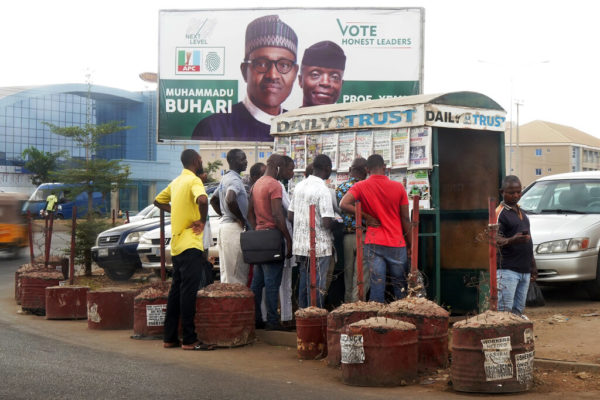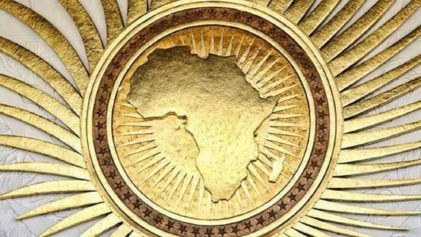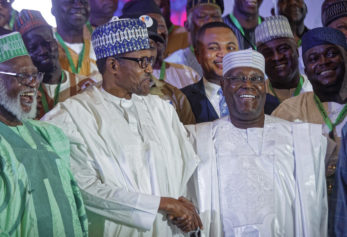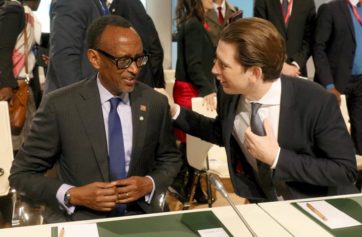KANO, Nigeria (AP) — As Nigeria tensely await the results in its election in which President Muhammadu Buhari seeks a second term in Africa’s most populous country, observers are giving mixed assessments of the polling process.
The African Union said the “overall political climate remained largely peaceful and conducive for the conducting of credible elections” but criticized poor preparation and called for calm until final results are announced, which could come as early as Monday.

Nigerians read newspapers at a newsstand in Abuja, Nigeria, Monday Feb. 25, 2019. Official results of Nigeria’s presidential election are expected as early as Monday in what is being seen as a close race between Incumbent President Muhammadu Buhari and opposition candidate Atiku Abubakar. (AP Photo/Jerome Delay)
The election was originally scheduled for Feb. 16 but then, just hours before polls were to open, the electoral commission postponed the election for a week, citing logistical issues. When voting took place on Feb. 23 there were numerous delays causing many polling stations to open hours late. Some polling stations had to remain open a day later in order to allow people in line to vote.
A more critical assessment came from a Nigerian observer group which complained of “major logistic lapses” including widespread delays and “disappointing” conduct by political parties. The Situation Room group called this election a step back from the one in 2015, seen as one of Nigeria’s most transparent and efficient.
It said at least 39 people were killed in violence related to Saturday’s vote.
The delay in voting was also criticized in a joint statement the U.S.-based observer missions, the International Republican Institute and National Democratic Institute.
“The last-minute postponement of the election by INEC (Nigeria’s electoral commission) and significant delays in the opening of polling units risk undermining citizen confidence in elections and disenfranchising voters,” said the U.S. observers.
Nigeria’s major political parties remain the weak link in ensuring an inclusive election process and have issued worrisome statements, the U.S. observers noted.
Despite the voting issues, Nigerians have showed resilience and patience, the U.S.-based observers said.
In Kano, Nigeria’s second-largest city and the heart of the largely Muslim north, Nigerians waited patiently for results.
Buhari will win, 18-year-old student Yusuf Bello said, calling top opposition challenger Atiku Abubakar “a thief. A corruption man.” The former vice president, who has made sweeping claims to turn around the post-recession economy, has never managed to shake graft allegations.
Buhari, a former military dictator from the north, is seen by many Nigerians as being relatively upright in a country riddled by corruption.
But the election could be decided on economic issues. A bag of rice that was 7,500 naira ($20) before Buhari took office is now 15,000 naira ($40), said Nasir Auwal, a 35-year-old bank worker.
He supports Buhari, however, saying the threat from the Islamic extremist group Boko Haram has essentially disappeared in the city that once saw mosques and markets targeted.
“Before, when I left my house my wife would cry because she was afraid I would not come back,” Auwal said.
One man who worked in security during the election, 27-year-old William Thomas, said the vote went peacefully with “no political thugs.”
As an election worker, however, he did not have the chance to vote — a situation that thousands across the country faced while helping millions of Nigerians perform their civic duty.
Associated Press contributed to this story.


